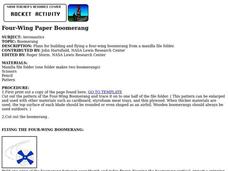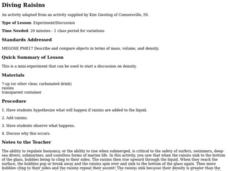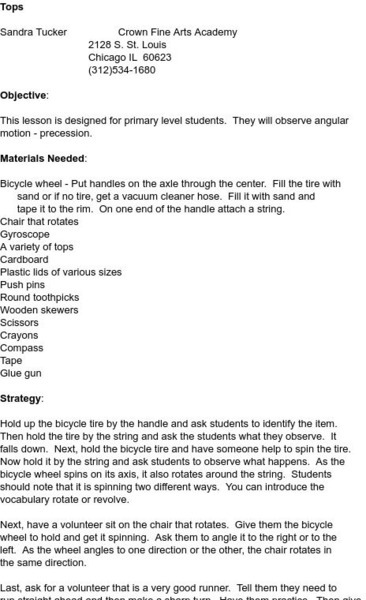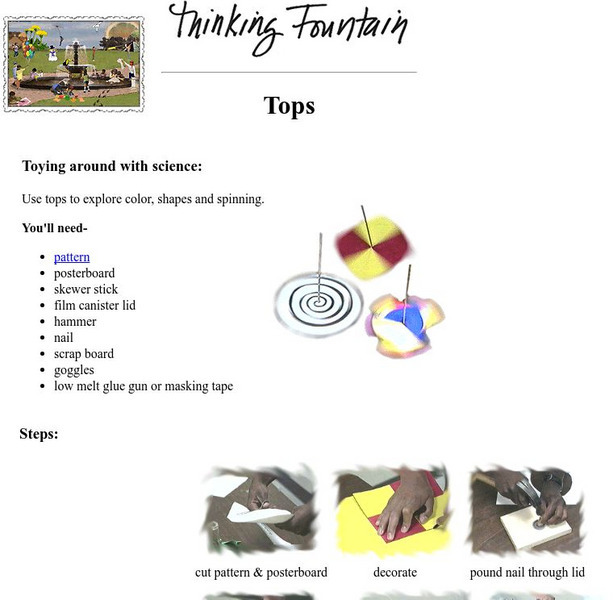Curated OER
So Fast! So Slow!
Fifth graders give examples of objects that move slow and fast. In this physics lesson, 5th graders rank animals according to how quickly they move. They create a bar graph of organisms versus rates of speed.
Curated OER
Four-Wing Paper Boomerang
Learners build a four-wing paper boomerang. In this aeronautics lesson, students construct a paper boomerang and identify the forces at work during flight.
Curated OER
Create a Tornado
Young scholars study weather patterns and conditions by making their own tornado. In this tornado lesson, students create a tornado in a bottle to study weather conditions.
Curated OER
Diving Raisins
Learners hypothesize and observe what occurs when raisins are dropped in a carbonated liquid. They examine buoyancy and how density effects ascent and descent.
Curated OER
Phases of the Moon: Cooperative Learning
Third graders examine the phases of the moon. In this moon phase lesson, 3rd graders listen to a read aloud of The Moon Seems to Change by Franklyn M. Branley and discuss the phases of the moon. They complete a moon phase calendar and...
Curated OER
Four-Wing Paper Boomerang
Students cut out the pattern of the Four-Wing Boomerang and trace it on to one half of the file folder. They practice throwing it.
Curated OER
Create a Tornado
In creating a tornado, students create a model tornado in a two-liter soda bottle. In order to accomplish this feat, students label each of their bottles with a marker, then tape the mouths of the bottle together and fill with water....
Curated OER
Diving Raisins
Students participate in a mini lab to explore density. In this density lesson students view a demonstration and answer questions.
Curated OER
Tracking Satellites Using Latitude and Longitude
Students investigate how to track satellites using latitude and longitude. They investigate what man learns from all the satellites currently being studied today. Students analyze the four basic types of satellite orbits.
Science and Mathematics Initiative for Learning Enhancement (SMILE)
Smile: Lab Activity: Tops
The Illinois Institute of Technology provides a lab activity on precession and spinning tops. Designed for primary grades, but easily adapted for any level. Includes directions and assessment ideas.
Science Museum of Minnesota
Science Museum of Minnesota: Tops
In this lesson make a spinning top to explore the concepts of shape, color, spinning, and optical illusions.
Children's Discovery Museum
Children's Discovery Museum of San Jose: Color Blending Top
Put a new spin on blending colors by creating your own spinning top. Mix colors through motion and make this optical illusion spring to life.
Science Education Resource Center at Carleton College
Serc: Investigating Movement of Tops
Students will raise questions about the way tops move by observing, through exploration/inquiry time, what they are made of, how the shape of each top affects its movement and what surface is best for a top to spin longest. As they...
Center of Science and Industry
Cosi Columbus: Bottle "Tops"
Learn about rotation and balance in this hands-on science experiment. Includes full list of materials, procedures, and scientific explanation of how wobbling affects the "spin time" of an object due to it being unbalanced.
TeachEngineering
Teach Engineering: Mechanics Mania
Through ten lessons and numerous activities, students explore the natural universal rules engineers and physicists use to understand how things move and stay still. Together, these rules are called "mechanics." The study of mechanics is...













